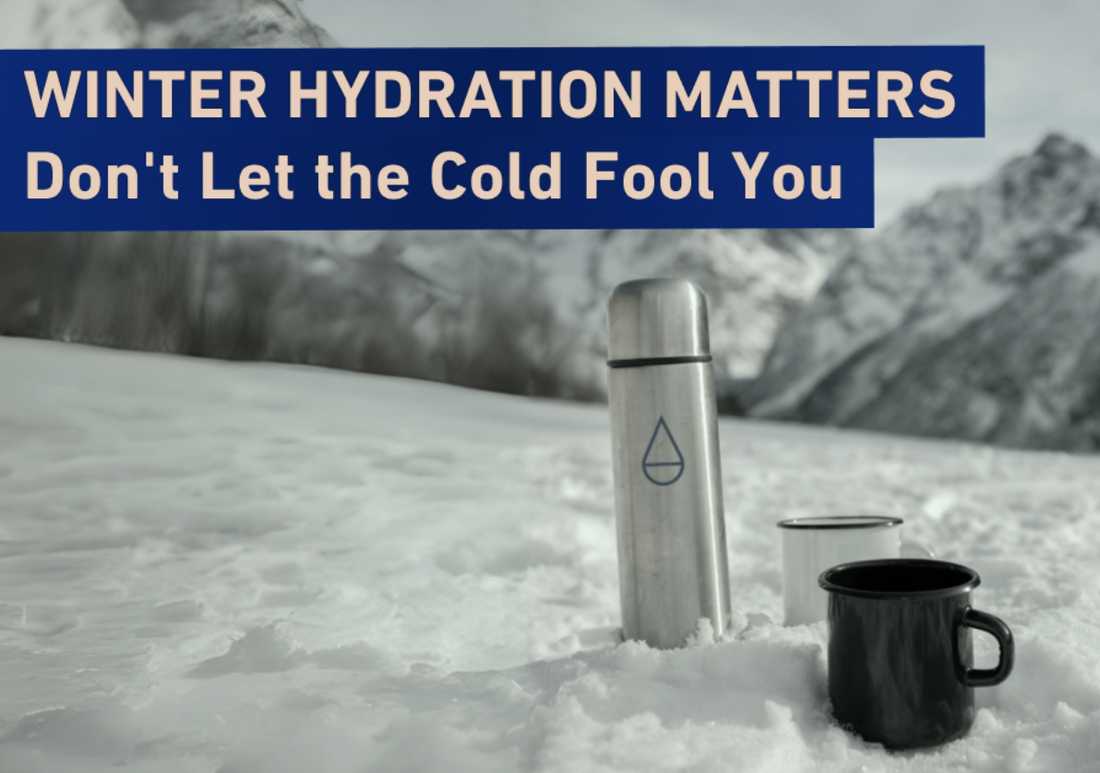
Stay Hydrated This Winter: Why It Matters and How to Do It
Share
As the cold weather settles in, it's easy to overlook hydration. However, winter dehydration is a real concern, one that can affect your energy, immunity, and overall health. Even though we may not feel thirsty as much in winter, our bodies still require the same level of hydration as in warmer months.
Here’s everything you need to know about winter dehydration and how to stay hydrated all season long:
I. Why Dehydration Occurs in Winter
During the colder months, there are several factors that contribute to dehydration:
Dry Air: Cold air is inherently dry, which leads to increased water loss through your skin and breath. When the air is dry, you may not notice the moisture being lost, but your body is still losing valuable fluids.
Indoor Heating: While it keeps us warm, indoor heating can lower humidity levels in the air. As a result, your body loses moisture more quickly, leading to dehydration. Dry air in your home can cause your skin and mucous membranes to become dehydrated, increasing the risk of health issues.
Reduced Thirst Sensation: In colder weather, your thirst response is naturally dampened. Studies show that the feeling of thirst can decrease by as much as 40% in colder conditions. This reduction in thirst can make it harder for you to remember to drink enough water.
II. Recognizing the Signs of Winter Dehydration
Dehydration doesn’t always show up as thirst. In the winter months, dehydration symptoms can sneak up on you. Watch for these common signs:
Dry Skin and Lips: Chapped lips, flaky skin, and dry eyes are early signs that your body needs more hydration. When the skin becomes dehydrated, it loses its ability to retain moisture, resulting in cracks and irritation.
Dark Urine: Your urine should be pale yellow. If it's dark yellow or amber in color, it’s a clear indication that you need to drink more fluids.
Fatigue and Dizziness: Dehydration can cause feelings of tiredness and lightheadedness, especially in cold weather. If you’re feeling unusually fatigued or dizzy, it could be a sign that your fluid intake is insufficient.
III. Activities and Substances to Monitor
Certain behaviors and substances can lead to increased fluid loss, so it’s important to be mindful of them during the winter months:
Caffeine Intake: Drinks like coffee and tea are diuretics, meaning they encourage your body to produce more urine, leading to fluid loss. Be mindful of your caffeine intake, especially if you're consuming multiple cups per day.
Alcohol Consumption: Alcohol is another diuretic that can dehydrate you, and winter is no exception. Drinking alcohol, especially in cold weather, can make it harder for your body to retain the moisture it needs. Moderating alcohol consumption is important to prevent dehydration.
Intense Physical Activity: While it’s common to think dehydration only occurs during hot weather, intense exercise during the winter months can also lead to fluid loss. Whether you’re skiing, hiking, or hitting the gym, always hydrate before, during, and after physical activities.
IV. Practical Tips to Stay Hydrated
Now that you understand why hydration is important in winter, here are some practical ways to ensure you stay on top of your fluid intake:
-
Drink Warm Beverages: Enjoying warm beverages like herbal teas or warm lemon water is an excellent way to stay hydrated while also keeping warm. These drinks are soothing, hydrating, and provide additional benefits, such as antioxidants in herbal teas and vitamin C from lemon.
-
Infuse Your Water with Flavor: If you find plain water difficult to drink, try infusing it with flavors. Adding a splash of lemon, lime, or even cucumber can make it more enjoyable. Alternatively, try adding some electrolyte-rich beverages like Soté Electrolytes to your daily hydration routine, providing your body with essential minerals to support hydration. Our must-have for the cold weather is the delicious Chocolate Flavor made with cocoa powder.
-
Eat Hydrating Foods: Many fruits and vegetables have a high water content, which makes them perfect additions to your winter diet. Watermelon, cucumbers, oranges, and celery are just a few examples of hydrating foods that support fluid balance.
-
Use a Humidifier: Indoor heating systems can dry out the air in your home, leading to moisture loss from your skin and respiratory system. Using a humidifier can help add moisture back into the air, making it easier for your body to maintain its fluid levels.
-
Set Reminders to Drink Water: It’s easy to forget to drink water, especially when you’re not feeling thirsty. Set reminders on your phone or place a water bottle in your line of sight to keep you on track throughout the day.
By incorporating these habits into your daily routine, you can prevent winter dehydration and maintain optimal hydration all season long. Your body will thank you with improved energy, better skin, and a reduced risk of illness.
Remember: Hydration is a year-round health concern, and we'll never get tired of saying HYDRATION IS KEY to good health because water is essential for most of the body's functions, and we function all year round, right? By staying ahead of dehydration, you’ll feel better, perform better, and enjoy the colder months to the fullest. Take the time to hydrate today for a healthier tomorrow.
Shop a bag of Chocolate-infused hydration perfect for the cold season, click here.

